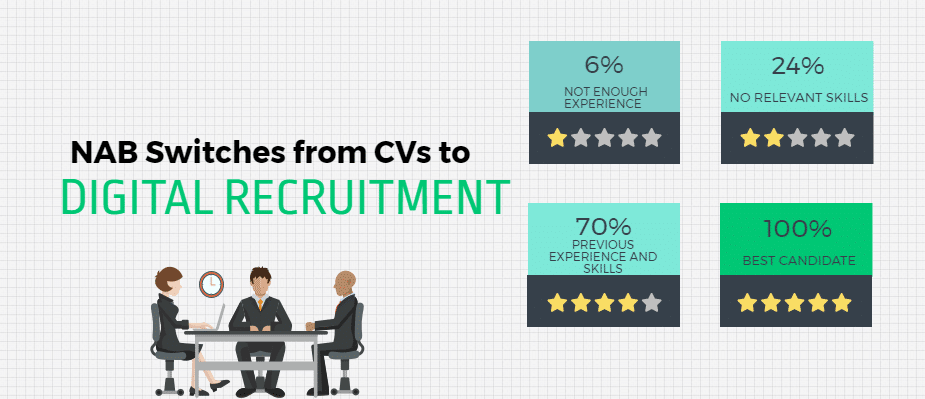
NAB Switches from CVs to Digital Recruitment
National Australia Bank have cut the use of resumes and face-to-face interviews in recruitment for entry-level positions. The bank argues that a move to digital recruitment has heavily reduced their employee turnover rates, and radically lessened prejudicial hiring based on affluent university attendance.
NAB’s switch to digital recruitment is part of a wider shift across large companies to refresh and revamp their hiring processes using human resources technology.
NAB experiences better employee success with digital recruitment
NAB first implemented digital recruitment around a year ago. They introduced recorded video interviews, as well as online cognitive assessments. Since then, they have extended their digital recruitment to encompass the hiring of 2500 entry-level jobs annually.
The cognitive assessments evaluate candidate’s problem-solving capabilities through random questioning. For example, a potential employee may have to quickly select which image should be next in a sequence. Candidates then provide a pre-recorded interview video where they must answer specific questions. An algorithm then analyses the video for certain desired words, experience, and achievements to produce a candidate short-list.
Lorraine Murphy, NAB Chief people officer, told the Australian Financial Review that the new digital recruitment scheme has saved over 700 hours monthly in management time, reduced turnover by 50%, and quickened the pace of hiring.
“The model helps us to identify and hire great people in a fairer, more effective way and reduce the risk of unconscious bias – things like your name, what school you went to are irrelevant,” she told AFR.
“The model had been particularly well received by digitally-savvy candidates, who the bank is keen to hire.”
Resumes no longer the best hiring method
Ms Murphy noted that although this doesn’t signal the instant death of the resume, digital channels are becoming increasingly more common points of reference for employers.
“LinkedIn is now a far more common way to display background information, and companies now have far greater access to information,” she told AFR.
University of Melbourne Professor in management, Michelle Brown, told the AFR that resumes are increasingly seen as dated and unreliable.
“They’re not really particularly accurate. People say they’ve got qualifications which they haven’t, done subjects they didn’t do, have experiences they don’t really have. They may not lie but they embellish,” she told AFR.
Referees also aren’t reliable, as it is unlikely candidates would select anyone who would say a bad word about them. Ms Brown greets the new online tests as more “objective” and better adept at assessing candidate suitability.
“In the past, employers have just used this one criteria which is the university candidates came from – which is connected to socio-economic status because poor people go to the less expensive universities.”
“Now they’re looking at more jobs appropriate criteria and presumably moving towards greater diversity and diverse educational background,” she said to AFR.
Digital recruitment better for assessing suitability
NAB is not alone in their shift to online human resources and digital recruitment. Insurance company AMP and hotel chain Marriot have both introduced computer games as a way to test candidate suitability. L’Oreal axed resumes in 2015 for online video interviews.
This shift is logical. Increasingly, computer-based algorithms are seen as better at making hiring decisions. Recent research from the Harvard Business school found that giving preference to a candidate’s test scores – over manager discretion – significantly increased the quality of successful applicants. Additionally, it was found to lead to employees staying with the company around 15% longer.
Effective and efficient recruitment is paramount in business. Hiring the wrong candidate for the job is expensive. Research has shown that the hard cost of an incorrect hire can range between 50 and 200% of the employee’s first-year wage, dependent on position level. Furthermore, your business can suffer a loss of confidence in managerial capability, as well as a loss of competitive industry advantage. Roubler will make sure you get the right hire every time. Roubler’s ever-learning algorithm automatically assesses candidate suitability for your specific role requirements. Then, once you’ve hired the perfect employee, Roubler has training, scheduling, time and attendance, and payroll sorted. Get in contact today to find out more.